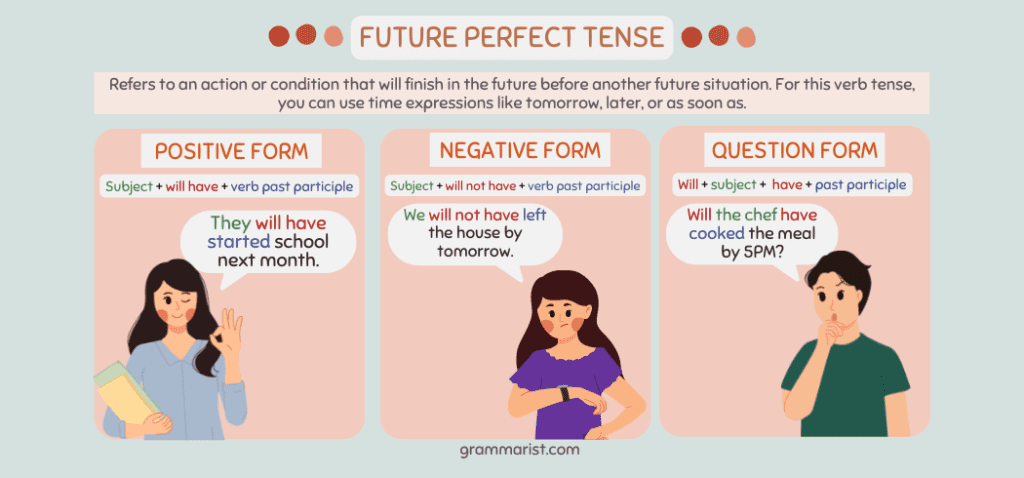We use different tenses whenever we place verbs into sentences without even realizing it. One example is the future perfect tense, also known as the will have tense.
Once you finish reading my article, you will have understood the English verb usage of future perfect tenses. I promise!
What is the Future Perfect Tense?

You already know that a verb is a part of speech that expresses time while showing action, existence, or condition. We learn that pretty early on in life, but there are actually tons of different verb tenses and types. One verb tense you should know is the future perfect tense.
In English grammar, the future perfect tense refers to an action or condition that will finish in the future before another future situation.
Unlike the simple future tense and other future tenses, the future perfect tense has a “deadline.” This specific time should be mentioned in the sentence. For this verb tense, you can use time expressions like tomorrow, later, or as soon as.
Meanwhile, the future progressive tense shows an ongoing action in the future.
Below are pairs of sentences in the future perfect tense and simple future tense.
- Future perfect tense: He will have completed this project next week once he analyzes the data.
- Simple future tense: He will complete this project next week.
- Future perfect tense: Linda will have finished the bowl of soup as soon as the main course is served.
Simple future tense: Linda will finish the bowl of soup.
Future Perfect Tense formula
The basic formula for the future perfect tense is the auxiliary verb combination will have and the past participle of the action verb.
You can add -d or -ed for its past participle if it’s a regular verb. But some past participles do not end in -d or -ed. Instead, they require spelling changes. These are called irregular verbs. For instance, buy becomes bought.
Positive Form
Positive future perfect tense verbs follow this structure:
- Subject + will have + past participle verb form.
For example:
- They will have started law school next month.
Negative Form
Negative sentences always use the word not to form a verb phrase.
- Subject + will not have + past participle form of the verb.
For example:
- We will not have left the house by the time winter arrives.
Question Form
The examples above are all declarative questions. When asking questions, the correct verb form sequence is the auxiliary verb, subject, and verb. Follow this formula:
- Will + subject + have + past participle
Below is an example of the question version in future perfect form.
- Will the scientists have created a time machine when we reach 2080?
Here is the structure for a question-word question:
- Question + will + subject + have + past participle verb form.
For example:
- Where will the teachers have met by the time we use the session hall?
When to Use Future Perfect Tense

The only use of the future perfect tense is to show the sequence of events completed before a specific time in the future. You can also use it to discuss an action that occurs before another future action. Here are some examples.
- You will have earned your university degree by the time I bear a third child.
- By this time tomorrow night, we will have landed in Japan.
- Amy will have finished the painting when Jolene comes.
Some people use the future perfect tense to make convictions about something that will or will not happen in the future. For example:
- I believe Martha will have organized her schedule by the time I give new assignments.
- Christine will not have talked to Kate this weekend because of their previous argument.
When Not to Use Future Perfect Tense
Just like anything, there’s a right and wrong place for things. Do not use the future perfect tense when the future action has no deadline. If there is no deadline, the best verb tense to use is the simple future tense. For example:
- Incorrect: Will you have answered my call?
Correct: Will you answer my call?
How to Change a Future Perfect Sentence into Passive Form
While the active verb form is will/will not + have + past participle,the correct form for passive sentences is will + have been + past participle. For example:
- Active verb form: She will have won the prize once the match ends.
Passive verb form: The prize will have been won by her once the match ends.
What Phrases Can I Use with the Future Perfect Tense?
Aside from by this time next week/month/year, here are other phrases you can use with this verb tense.
- At (midnight).
- Four days from now.
- By the time (the performance is over)
- When (classes start)
- As soon as (I get my license)
Remember that these time expressions also apply to the simple future tense.
What is the Future Perfect Tense of Dream?
First, it’s essential to know the past participle of dream, which is dreamt. The future perfect form is will have dreamt.
What is the Future Perfect Tense of Spill?
The past participle of spill is spilled. Therefore, its future perfect form is will have spilled.
What is the Future Perfect Tense of the Word Search?
The future perfect tense of search is will have searched.
Future Perfect Verb Tense in a Nutshell
Did my guide help you better understand? The future perfect tense is essential for any future event that will have been completed in another hypothetical future.
Learning the different types of verb tenses will help you achieve perfect grammar and be more accurate with expressing time in your sentences. Discover the other English verb tenses and their usage now.